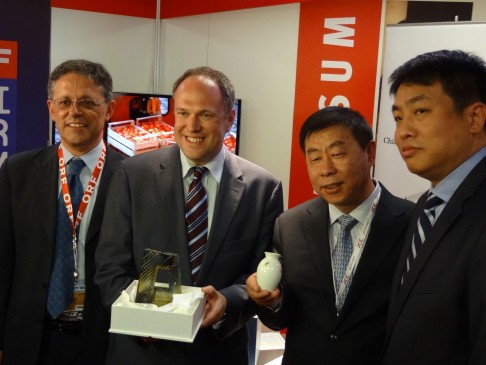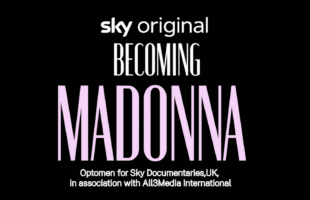
Cannes / Vienna, April 9 – At 3pm on Tuesday April 9th at ORF’s MIP stand, Richard Grasl, ORF’s Chief Financial Officer, signed a Memorandum of Understanding with Ming LUO, Vice President of CCTV, Beijing, for the exchange of expertise and for the coproduction of new wildlife and nature films together with ORF’s celebrated UNIVERSUM strand.
Signatories at the CCTV-ORF MOU ceremony, from L-R, Head of Universum Andrew Solomon, Richard Grasl, ORF’s Chief Financial Officer, Ming LUO, Vice President, CCTV, and Liu Wen, Managing Director, CCTV.
Richard Grasl said: “For more than a quarter of a century UNIVERSUM has set international standards for the highest quality natural history documentaries, and it is especially gratifying to see this recognised by China’s national all-documentary channel, CCTV9. China’s documentary channel has already broadcast a number of our documentaries, and we are now delighted by the prospect of producing together. Our first cooperation, Triumph of the Tomato, celebrates the hidden wonders of the much loved fruit. In a spectacular film shot on three continents, UNIVERSUM veteran Maria Koller will succeed in persuading viewers that they have never tasted a real tomato!”
Luo said: “China and Austria are both countries with a history of creating a brilliant civilisation. Although our two countries are geographically far apart, the people of China are certainly no strangers to famous Austrian composers such as Haydn, Mozart, Schubert and Johann Strauss. Today’s signing ceremony marks the start of a new stage of cooperation between the two partners in the area of documentaries. I am confident that our coproduction of Triumph of the Tomato will be a complete success. I firmly believe that we will find more and more co-production documentary projects that will help the television audiences of our two countries better understand each other and become better friends.”
On the choice of ORF as co-production partner, Luo tells TV ASIA Plus he was impressed with ORF’s expertise in the documentary field.
“We has no prior cooperation opportunities with ORF because we did not have much knowledge about ORF’s documentary production capabilities,” says Luo. “But after more interaction we have now come to realise that ORF’s documentaries carry substance, so we decided to collaborate.”
Head of Universum Andrew Solomon says that the MOU presents many opportunities.
“Universum has been running for 26 years and represent high end documentary series and increasingly, in order to make programmes around the world with the highest production values, we can’t do it alone. We need international partners, and with the growth in particular of CCTV-9, the all-documentary channel of CCTV – CCTV was looking to do more production and to get more involved internationally – it’s a wonderful opportunity for both sides to combine resources and to co-produce programmes that we want both our audiences to see and that can distributed around the world,” says Solomon.
Both parties acknowledged that the decision to make the seemingly unspectacular tomato the subject matter was a surprisingly easy one to make. Luo says both development heads met and pinned down the topic, in one seating, without any struggle. Solomon calls it was “an almost instant agreement.”
“Chinese audiences love the tomato. It has broad appeal across the country,” says Luo, who believes the universality of the topic will sustain interest. Luo says that the documentary will air on both CCTV 1 and CCTV 9 when completed, and there are plans to include more specialty channels on CCTV if the ratings indicate appeal.
On possibly dealing with media regulator SARFT’s restrictions, Solomon is not unduly concerned.
“Universen is famous for its wildlife programming. Wildlife films tend not to be controversial. We make beautiful films with strong stories and fabulous piuctures. I’m absolutely sure that we’ll be able to do better with a partner like CCTV-9,” says Solomon. “I look forward to the conversations with SARFT. I hope that we do have lively discussions with the Chinese government but I do think we can find lively topics that won’t require such “lively discussions” as I think we’re going to find lots of joint topics that will appeal to both audiences. We want to know what interests the Chinese audiences. Part of it is finding out what works.”
|
About Triumph of the Tomato The original Peruvian tomat’l – ‘swollen fruit’ – was yellow. Conquistadores prized it for its blossom. But under the Spanish sun its lycopene went crazy. Rounded and red, it became irresistible. In Austria they still call it the “paradise fruit”, and in Italy the “golden apple”. Today’s obsession with shape, size and long shelf-life has reduced the once glorious tomato to mushy tastelessness. But the counter-revolution is in full swing! From tomato seedster Erich Stekovics with 3,200 varieties stored in nylon stockings, to tomato tsarina Irina Zacharias, saved by the red fruit after the fall of Communism. From the pizza that boosted Queen Margarita’s sex life to Chinese Tomato King Li Jingfu’s 32 new strains, cross-bred to feed his fellow countrymen – and Joe Cocker, who serenades the crimson fruit and knows “it’s Blues they like best”. Shanghai has a restaurant where every dish on the menu contains tomato – even the beer! Qataris grow them in the desert – without water. The tomatoes grow 800 metre roots, picking up plenty of tasty minerals on the way. This film squeezes inside the tomato – literally – to demonstrate just how it manages to make itself irresistible. You’ll understand why people go crazy at tomato festivals in Spain and Italy – and you may also realise that you have never, ever tasted a real tomato – yet! |









